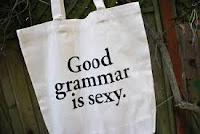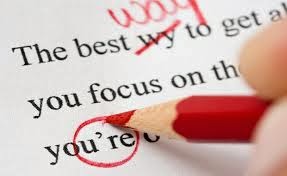 It’s easy to
misspell a word here or there or forget important punctuation on occasion, but
sometimes those blunders can be embarrassing and even laughable which can
really mess with your reputation, especially because readers are laughing at
you, not with you! The benefit of having an external proofreader and/or editor is
that a good grammar checker will ensure you don’t miss important gear that
makes your copy readable and accurate, eliminating all possibility of humiliation.
It’s easy to
misspell a word here or there or forget important punctuation on occasion, but
sometimes those blunders can be embarrassing and even laughable which can
really mess with your reputation, especially because readers are laughing at
you, not with you! The benefit of having an external proofreader and/or editor is
that a good grammar checker will ensure you don’t miss important gear that
makes your copy readable and accurate, eliminating all possibility of humiliation.
Things like this!!!!
-- need to be used sparingly as they dilute what you are inferring to. They can
be taken the wrong way, bringing their own tone and sound angry or even smart
arsey. This goes for over using ellipsis, which should be three dots only, not
seven. Also, emoticons we use in text? -- not punctuation, :-0 okay? Good
punctuation is imperative, it’s powerful. Imagine if I wrote, ‘Let’s eat nana’,
instead of ‘Let’s eat, Nana?’ or ‘Wanted: one-night stand’ rather than ‘Wanted:
one nightstand’. It matters to get it right or you could be in real trouble.
Sometimes missing
letters or words can be catastrophic for a writer. A good spell checker won’t
leave you hanging with ‘Boob’ when it was meant to be ‘Bob’, or ‘Joe Bloggs,
rapist’, instead of ‘Joe Bloggs, Therapist’ or ‘White Ho reporter, Jane Bloggs’,
instead of ‘White House reporter, Jane Bloggs’…see what I mean? Awkward.
The point
is, we proofread our writing for grammatical errors and bad spelling, but
punctuation is equally significant. It’s hard these days because many of us
write blogs and those of us that do, write conversationally; the way we speak.
I think that’s fine but in newsprint, newsletters, corporate documentation,
websites and student uni dissertations, it needs to be formalised. Cut out the
additional ellipses and use em dashes, forget the slang – dress up your
language. I know we don’t say, in real
life, things like, ‘please don’t hesitate to call me should you require
anything further’, we say, ‘give me a call if I can help you with anything else…’
but that’s how we roll and what people expect, unless it’s a novel or piece of
creative writing, then there is a colloquialism expectation and acceptance.
On occasion,
grammatical errors are mistaken for spelling errors. This is when the spelling
is actually correct but used inaccurately, such as ‘the plain descended rapidly’
rather than ‘plane’ or ‘breath easy’, instead of ‘breathe easy’. These are not
spelling gaffes, they are grammar blunders, and they are not okay.
There are
plenty of freelance editors and proofreaders out there, it just so happens. I’m
the best ;-)…whoops just broke my own rule. www.kirstieanders.com
















